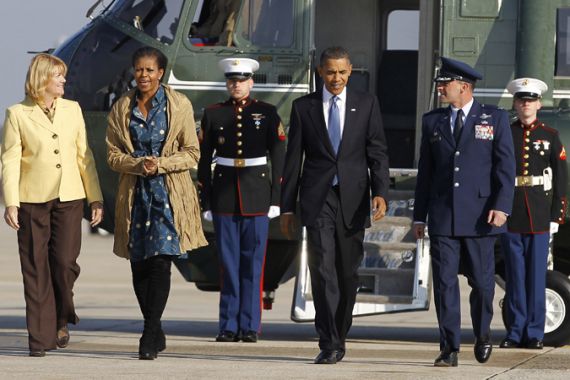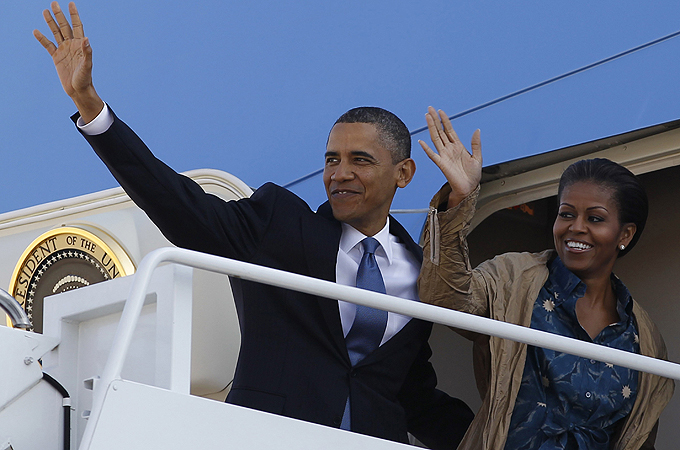Obama due in India on Asian tour
US president due to visit India, Indonesia, South Korea, and Japan in effort to strengthen economic ties.

 |
| US President Barack Obama and first lady Michelle Obama step aboard Air Force One [Reuters] |
Barack Obama, the US president, is due to arrive in India on the first leg of a 10-day trip to Asia that aims to boost exports and create US jobs.
Obama will spend a busy four days in India after he arrives on Saturday, including a meeting with top Indian and US business leaders.
His first stop in India will be the country’s financial capital, Mumbai.
The visit to Mumbai will see Obama and his wife Michelle become the most high-profile guests to stay at the Taj Mahal Palace hotel since the attacks two years ago by 10 armed men that claimed 166 lives.
Obama is expected to meet survivors and pay tribute to those who died at a permanent memorial erected at the luxury seafront hotel, which was the focus of the militant assault and where 31 people, including 12 members of staff, were killed.
|
|
Security is tight for the visit, with roads closed, a ban enforced on sea traffic off the coast, and the plaza near the Taj and Gateway of India monument sealed off.
His Asian tour will also take Obama to Indonesia, South Korea and Japan, where he intends to blend trade talks and other economic diplomacy with assurances to Asian allies worried by an increasingly assertive China.
Obama is expected to announce a “comprehensive partnership” including economic ties in Indonesia, attend a G20 summit of global economic powers in Seoul and participate in an Asia-Pacific economic forum in Yokohama, Japan.
White House officials accompanying the president said the trip would be “highly significant”.
“It will take the relationship to a different level, going beyond bilateral issues to a more global partnership,” Tom Donilon, Obama’s national security adviser, told reporters travelling to India aboard Air Force One with the president.
But Al Jazeera’s Rosiland Jordan, reporting from Mumbai, said that the US president would have to be politically careful not to appear too willing to open US markets.
“Indian entrepreneurs will be looking for ways to gain a toe-hold in the all-important American consumer market,” our correspondent said.
The administration plans 17 or 18 announcements during the trip on a range of economic, security and political issues, White House officials said.
China on agenda
Obama’s trip comes just days after his Democratic Party suffered significant reverses during US midterm elections.
Aides have confirmed that Obama will raise the controversial issue of China’s yuan currency throughout the trip – as well as discuss North Korea’s nuclear weapons and Chinese human rights when he meets with his Chinese counterpart during the G20.
|
|
American officials say Beijing keeps the yuan’s value low to aid Chinese exports to the US at the expense of American jobs.
In recent weeks, regional tensions have also flared over territorial disputes with Japan and over Chinese exports of rare earth minerals needed to make many high-tech products.
Obama seeks to double US exports in five years and the administration is working to remove obstacles to a long-stalled free trade agreement with South Korea in time for Obama’s meeting with South Korean President Lee Myung-bak in Seoul.
Failure would send a negative signal about US openness to more trade, after an election campaign marked by protectionist rhetoric towards China and outsourcing hubs like India.
“There are very high expectations (that Obama can deliver a Free Trade Agreement) in Korea, not just in Korea, but in the region,” Victor Cha, a senior adviser and Korea chair at the Center for Strategic and International Studies in Washington, said.
“The FTA is important in terms of perceptions of the US presence and leadership in Asia,” Cha said.
Rebuffed domestically on Tuesday by the loss of control of the US House of Representatives to Republicans, Obama can count on a warm reception in Asia where many leaders want American power to counter Beijing, although some observers questioned how much the trip will yield given pressures at home.
“Obama is going to be too preoccupied domestically, and you won’t see a more aggressive foreign policy going forward,” Amitabh Mattoo, professor of international politics at Jawaharlal Nehru University in New Delhi, said.